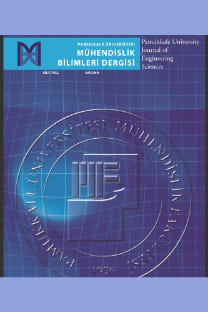Sipariş toplama sıklığı düşünceleri altında veri güdümlü depolama yeri atama problemi: Sezgisel bir yaklaşım
Depolama yeri ataması, Ürün toplama, K-Ortalamalar kümelemesi, ABC analizi, Karışık tam sayılı karesel optimizasyon, Aç gözlü sezgisel
Data driven storage location assignment problem considering order picking frequencies: A heuristic approach
Storage location assignment, Order picking, K-Means clustering, ABC analysis, Mixed integer quadratic optimization, Greedy heuristic,
___
- [1] Frazelle EH. Stock Location Assignment and Order Picking Productivity. Doctoral Dissertation, Georgia Institute of Technology. Atlanta, United States,1989.
- [2] Kofler M. Optimising the Storage Location Assignment Problem Under Dynamic Conditions. Doctoral Dissertation, Technisch-Naturwissenschaftliche Fakultät, Linz, Austria, 2014.
- [3] Gu J, Goetschalckx M, McGinnis LF. “Solving the forward-reserve allocation problem in warehouse order picking systems”. Journal of the Operational Research Society, 61(6), 1013-1021, 2010.
- [4] Kofler M, Beham A, Wagner S, Affenzeller M, Achleitner W. “Re-Warehousing vs. Healing: Strategies for warehouse storage location assignment”. 3rd IEEE International Symposium on Logistics and Industrial Informatics (LINDI), Budapest, Hungary, 25-27 August 2011.
- [5] Frazelle E, Sharp G. “Correlated assignment strategy can improve order-picking operation”. Industrial Engineering, 4, 33-37, 1989.
- [6] Muppani VR, Adil GK. “Efficient formation of storage classes for warehouse storage location assignment: A simulated annealing approach”. Omega The International Journal of Management Science, 36(2008), 609-618, 2007.
- [7] Battista C, Fumi A, Giordano F, Schiraldi MM. “Storage Location Assignment Problem: implementation in a warehouse design optimization tool”. Proceedings of the Conference Breaking Down the Barriers Between Research and Industry. Padua, Italy, 14-16 September 2011.
- [8] Yang C, Nguyen TPQ. “Constrained clustering method for class-based storage location assignment in warehouse”. Industrial Management & Data Systems, 116(4), 667-689, 2015.
- [9] Jane CC, Laih YW. “A clustering algorithm for item assignment in a synchronized zone order picking system”. European Journal of Operational Research, 166(2005), 489-496, 2005.
- [10] Bindi F, Manzini R, Pareschi A, Regattieri A. “Similarity-based storage allocation rules in an order picking system: an application to the food service industry”. International Journal of Logistics: Research and Applications, 12(4), 233-247, 2009.
- [11] Ene S, Öztürk N. “Storage location assignment and order picking optimization in the automotive industry”. The International Journal of Advanced Manufacturing Technology, 60(2012), 787-797, 2011.
- [12] Norén P, Eriksson J. Lund Institute of Technology. Department of Industrial Management and Engineering. “A heuristic algorithm for space allocation in a pallet storage warehouse”. https://lup.lub.lu.se/luur/download?func=downloadFile&recordOId=1883111&fileOId=1883113 (12.06.2020).
- [13] Dantzig, GB. “Discrete variable extremum problems”. Operations Research, 5(2), 266-288, 1957.
- [14] Xu J, Lim A, Shen C, Li H. “A heuristic method for online warehouse storage assignment problem”. IEEE International Conference on Service Operations and Logistics, and Informatics, Beijing, China, 12-15 October 2008.
- [15] Wisittipanich W, Kasemset C. “Metaheuristics for warehouse storage location assignment problems”. Chiang Mai University Journal of Natural Sciences, 14(4), 361-377, 2015.
- [16] Kim, J, Méndez, F, Jimenez, J. “Storage location assignment heuristics based on slot selection and frequent ıtemset grouping for large distribution centers”. IEEE Access, 8, 189025-189035, 2020.
- [17] Yongxia Z. “On a multi-standard ABC analysis method in the inventory management of small and medium-sized enterprises”. International Conference on Advanced Information and Communication Technology for Education (ICAICTE), Hainan, China, 20-22 September 2013.
- [18] R Core Team. “R: A language and environment for statistical computing”. R Foundation for Statistical Computing, Vienna, Austria. http://www.R-project.org/ (16.03.2013).
- [19] Wickham H. “Reshaping data with the reshape package”. Journal of Statistical Software, 2007. https://doi.org/10.18637/jss.v021.i12.
- [20] Guerriero, F, Pisacane, B, Rende, F. “Comparing heuristics for the product allocation problem inmulti-level warehouses under compatibility constraints”. Applied Mathematical Modelling, 39, 7375-7389, 2015.
- [21] Durmuş B, İşçi Güneri Ö, İncekırık A. “Comparison of classic and greedy heuristic algorithm results in ınteger programming: Knapsack problems”. Mugla Journal of Science and Technology, 5(1), 34-42, 2019.
- [22] Floyd Robert W. “Algorithm 97: Shortest path”. Communications of the ACM, 5(6), 344-348, 1962.
- [23] Ryder A. “Floyd-Warshall Algorithm: Shortest Path Between All Pair of Nodes”. https://iq.opengenus.org/floyd-warshall-algorithm-shortest-path-between-all-pair-of-nodes/(05.05.2020).
- ISSN: 1300-7009
- Yayın Aralığı: 7
- Başlangıç: 1995
- Yayıncı: PAMUKKALE ÜNİVERSİTESİ
Global ölçekte faaliyet gösteren havalimanlarının göreceli sürdürülebilirlik analizi
Muhammet Enis BULAK, Funda Hatice ZENGİN, Fatma Serra ÇİFTÇİ
Mobilya işletmelerinde ergonomik yeterliliğin temel bileşen analizi (TBA) ile belirlenmesi
Velittin KALINKARA, Kadir ÖZKAYA, Taner DİZEL
Titreşen diskten girdap halkası kopmalarının deneysel incelenmesi
Elyaf takviye biçiminin polipropilen kompozitlerin kayma özelliklerine etkisinin araştırılması
Abdullah Onur ÖZDEMİR, Regaip MENKUC, Cetin KARATAS
Mustafa UÇURUM, Emrah GÜNEŞSU, Tolga Berkay ŞİRİN, Yusuf KAYNAK
Borsa endeks hareket yönünün çoklu lojistik regresyon ve k-en yakın komşu algoritması ile tahmini
Gülder KEMALBAY, Begüm Nur ALKIŞ
